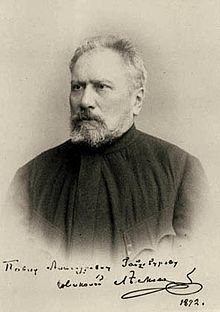The toupee artist
The toupee artist ( Russian Тупейный художник , Tupeiny chudozhnik ) is a short story by the Russian writer Nikolai Leskow , which was published in the Chudoschestwenny Schurnal on February 19, 1883 .
This commemoration of the dead commemorates February 19th jul. / March 3, 1861 greg. , the day of the lifting of serfdom in Russia .
background
Leskov tells a story that was told to him and his younger brother in 1840 when he was nine years old in Oryol by his nanny, the drinker Lyubov Onissimovna, called Lyuba, at the grave of her groom Arkady Ilyich.
Field Marshal Kamenski was killed by one of his peasants in 1809 for cruelty towards serfs. He left two sons. The elder Sergei (1771–1834) ran a lovers' theater in Oryol. Leskow has represented father and son in one person in this text.
Alexander Herzen had already used the material in his Diebischen Elster in 1848 .
content
The toupee artist Arkadi was a handsome young man and loved by everyone. The serf was a favorite of his master, Count Kamenski, but never got any money. Arkadi worked for the count as a hairdresser, barber and make- up artist . The 19-year-old actress Ljuba and the 25-year-old Arkadi fell in love.
Once in the bitter cold winter, Count Arkadi called over and ordered him to prepare the actress Lyuba for her evening performance and to bring her to him dressed as Saint Cecilia after the performance . Arkady staggered, because that meant that Lyuba was allowed to share the night's camp with the count as an odalisque for a while .
It didn't come to that. Arkadi kidnapped Lyuba. The destination was the Turkish city of Kütschük. Many had managed to escape from the Count there. On the way, the young couple wanted to be married by a priest in the village of Suchaya Orlitsa. Seven of the count's hunters with morning stars, long hunting whips and dog leashes were hot on the heels of the two fugitives. The priest collected the money from Arkadi for the wedding, but betrayed the couple to the persecutors who had penetrated his house.
Arkadi was tortured at the Count's court directly under the Ljubas chamber. The girl had to hear her groom groaning.
Lyuba could no longer appear in the theater. Apparently going insane, she was taken to the stockyard. People who had become similar to animals came there back then. Lyuba numbed her grief with alcohol.
After Arkadi was chastised by the count's hunters, he was shown a mercy as the count's former favorite. He was allowed to prove himself as a sergeant with the soldiers in battle . Arkadi breathed a sigh of relief. The master's tyranny was over.
Three years later: Ljuba worked in the calf barn. She couldn't go back to the theater. She had frostbite on her feet since fleeing to Kütschük. She didn't have the strength in her toes to dance on stage.
Arkadi, meanwhile an officer and ennobled, returned to Oryol and stayed in the suburb of Pushkar. With his cash of five hundred rubles he wanted to buy Lyuba out from the count. Before Arkady could get through to the count, the Pushkar innkeeper cut the sleeping guest's throat and took the money.
German-language editions
Output used:
- The toupee artist. German by Wilhelm Plackmeyer. P. 166–193 in Eberhard Reissner (Ed.): Nikolai Leskow: Collected works in individual volumes. The juggler pamphalon. 616 pages. Rütten & Loening, Berlin 1971 (1st edition)
Web links
- The text
- Entry in the Laboratory of Fantastics (Russian)
- Entries in WorldCat
Individual evidence
- ↑ Russian Художественный журнал, art journal
- ↑ Russian reference to first publication
- ^ Reissner in the follow-up to the edition used, p. 599
- ↑ Alexander Herzen: The thieving magpie. In: Julius Rodenberg (ed.): German magazine (= German magazine. Third delivery). Verlag von Oswald Seehagen, Berlin 1948, p. 135 ( full text in the Google book search)
- ↑ eng. Küçük Kaynarca
- ↑ Russian Сухая Орлица
- ↑ Russian regiment sergeant ( regiment )
- ↑ Russian Пушкар
